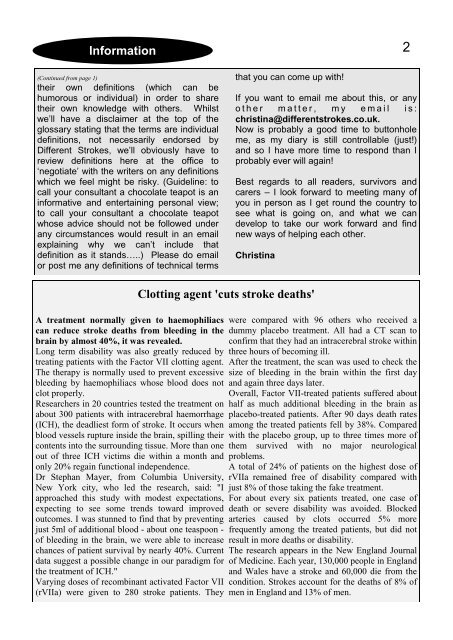Newsletter 28 - Different Strokes
Newsletter 28 - Different Strokes
Newsletter 28 - Different Strokes
You also want an ePaper? Increase the reach of your titles
YUMPU automatically turns print PDFs into web optimized ePapers that Google loves.
Information 2(Continued from page 1)their own definitions (which can behumorous or individual) in order to sharetheir own knowledge with others. Whilstwe’ll have a disclaimer at the top of theglossary stating that the terms are individualdefinitions, not necessarily endorsed by<strong>Different</strong> <strong>Strokes</strong>, we’ll obviously have toreview definitions here at the office to‘negotiate’ with the writers on any definitionswhich we feel might be risky. (Guideline: tocall your consultant a chocolate teapot is aninformative and entertaining personal view;to call your consultant a chocolate teapotwhose advice should not be followed underany circumstances would result in an emailexplaining why we can’t include thatdefinition as it stands…..) Please do emailor post me any definitions of technical termsthat you can come up with!If you want to email me about this, or anyo t h e r m a t t e r , m y e m a i l i s :christina@differentstrokes.co.uk.Now is probably a good time to buttonholeme, as my diary is still controllable (just!)and so I have more time to respond than Iprobably ever will again!Best regards to all readers, survivors andcarers – I look forward to meeting many ofyou in person as I get round the country tosee what is going on, and what we candevelop to take our work forward and findnew ways of helping each other.ChristinaA treatment normally given to haemophiliacscan reduce stroke deaths from bleeding in thebrain by almost 40%, it was revealed.Long term disability was also greatly reduced bytreating patients with the Factor VII clotting agent.The therapy is normally used to prevent excessivebleeding by haemophiliacs whose blood does notclot properly.Researchers in 20 countries tested the treatment onabout 300 patients with intracerebral haemorrhage(ICH), the deadliest form of stroke. It occurs whenblood vessels rupture inside the brain, spilling theircontents into the surrounding tissue. More than oneout of three ICH victims die within a month andonly 20% regain functional independence.Dr Stephan Mayer, from Columbia University,New York city, who led the research, said: "Iapproached this study with modest expectations,expecting to see some trends toward improvedoutcomes. I was stunned to find that by preventingjust 5ml of additional blood - about one teaspoon -of bleeding in the brain, we were able to increasechances of patient survival by nearly 40%. Currentdata suggest a possible change in our paradigm forthe treatment of ICH."Varying doses of recombinant activated Factor VII(rVIIa) were given to <strong>28</strong>0 stroke patients. TheyClotting agent 'cuts stroke deaths'were compared with 96 others who received adummy placebo treatment. All had a CT scan toconfirm that they had an intracerebral stroke withinthree hours of becoming ill.After the treatment, the scan was used to check thesize of bleeding in the brain within the first dayand again three days later.Overall, Factor VII-treated patients suffered abouthalf as much additional bleeding in the brain asplacebo-treated patients. After 90 days death ratesamong the treated patients fell by 38%. Comparedwith the placebo group, up to three times more ofthem survived with no major neurologicalproblems.A total of 24% of patients on the highest dose ofrVIIa remained free of disability compared withjust 8% of those taking the fake treatment.For about every six patients treated, one case ofdeath or severe disability was avoided. Blockedarteries caused by clots occurred 5% morefrequently among the treated patients, but did notresult in more deaths or disability.The research appears in the New England Journalof Medicine. Each year, 130,000 people in Englandand Wales have a stroke and 60,000 die from thecondition. <strong>Strokes</strong> account for the deaths of 8% ofmen in England and 13% of men.



